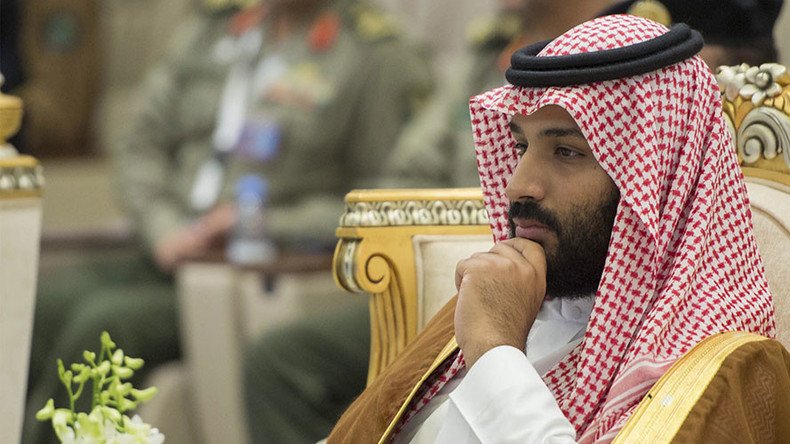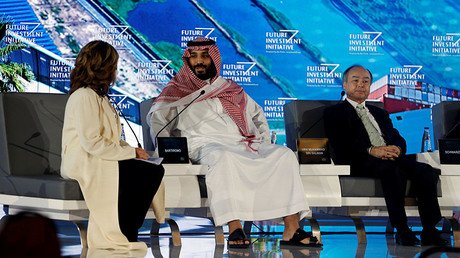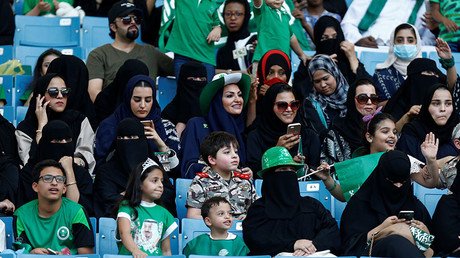11 Saudi princes, 4 ministers arrested as crown prince unleashes crackdown on corruption – report

Saudi Arabia has ordered the arrest of at least 11 Saudi princes and four incumbent ministers of the Saudi government, Al-Arabiya reported, citing sources. Among those detained are the minister of the National Guard and the minister of economy.
A new anti-corruption committee chaired by Crown Prince Mohammed bin Salman was created late Saturday by royal decree of King Salman bin Abdulaziz Al Saud, published by Saudi Arabia’s official news agency on Saturday.
The decree appoints the crown prince, Mohammed bin Salman, to lead the committee, granting it broad powers to fight corruption. The committee is exempted from “laws, regulations, instructions, orders and decision” while performing its wide range of duties, namely “identifying offenses, crimes, persons and entities” complicit in corruption, and gives it the power to impose punitive measures on those caught red-handed. Those include asset freezes, travel bans and arrests.
The committee made its first arrests hours after it was created, detaining 11 princes, four current ministers as well as “tens” of ex-ministers of the Saudi government in connection with newly opened corruption probes, Al-Arabiya reported.
Minister of the National Guard Prince Miteb bin Abdullah and Economy Minister Adel Fakeih are among those arrested, Al Arabiya cited a senior Saudi official as saying, on condition of anonymity. Alwaleed al-Ibrahim, owner of television network MBC, was also detained.
Dozens of former ministers were arrested by the Crown Prince committee, including a former governor of Riyadh province, former finance minister, and former chief of the Royal Court.
The committee said it is relaunching a probe into the devastating floods that killed over 120 people in the city of Jeddah in 2009, while inflicting millions in property damage. In wake of the wide-ranging investigation, concluded in December 2014, the Saudi court found 45 people guilty, including senior officials, on charges of bribery, misuse of power and public funds, money laundering and illicit business operations.
Another high-profile case resumed by the anti-corruption committee is the investigation into the outbreak of the so-called Middle East Respiratory Syndrome (MERS) virus in Saudi Arabia in 2014, which resulted in nearly 300 deaths and the ouster of the country’s health minister.
Most senior Saudi officials in charge of state oversight, investigation and prosecution will sit on the committee, which will comprise the attorney general and the heads of state security, anti-corruption authority, audit bureau, and the chair of the monitoring and investigation commission.
“In view of what we have noticed of exploitation by some of the weak souls who have put their own interests above the public interest, in order to illicitly accrue money,” the Saudi King said in a statement, explaining the need to form the body.
Crown Prince Salman, appointed the heir of the Saudi throne in June, is known for his reform-minded views. The prince, who held a number of key government positions even before his elevation, is said to be behind a series of the latest domestic reforms in the ultra-conservative country, loosening a grip on the state's strict social laws.
In one of the latest policy moves, the Saudi government lifted a ban on women driving. Crown Prince Salman reportedly spearheaded the milestone policy change, persuading his father, the king, to review the restriction. Earlier, women in Saudi Arabia were also permitted to use state services without male guardians.
The prince hinted last month that he would not stop at that, promising a return from hardline interpretation of the religion to what he described as “moderate Islam,” while vowing to eradicate extremist beliefs inside the country.














